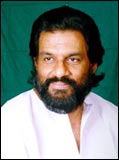 But with melody losing out to double meaning lyrics, and gyrating numbers replacing soulful renditions, Yesudas returned to classical music, only to re-emerge in a new avatar as a conservator of pure music.
But with melody losing out to double meaning lyrics, and gyrating numbers replacing soulful renditions, Yesudas returned to classical music, only to re-emerge in a new avatar as a conservator of pure music.
After captivating the hearts of millions with numbers like Gori tera gaon (Chitchor), Yesudas, who earned the title
of a 'complete singer' from the connoisseurs of Carnatic music, made an exit from Bollywood only to return with a bhajan compilation every now and then.
As a homage to great musicians, to promote the art and science of music in its purest form, and to identify and foster
talents, Yesudas is now opening a music institute at Thiruvananthapuram, Kerala.
"The institute will provide an opportunity to poor students who cannot seek admission in other institutes due to
the hefty fees charged by them. We will not only polish their talent but also provide them with good breaks," he says.
After singing more than 20,000 songs in different languages, and having recorded in all languages except Kashmiri
and Assamese, the musical genius also wants to set up a museum on the lines of Madame Tussaud's in London, showcasing wax statues of national and international musicians who have left indelible prints on time.
The institute would also house an archive of musical instruments and artefacts from around the world.
As far as working with Bollywood is concerned, he says he will gladly accept if the offers are interesting.
The star, known for his mesmerising voice, had taken to spirituality and found solace in religious discourses of Sri Narayan Guru. He soon set on a voyage to spread the message of 'one religion, one caste for all humans.' Film music took a backseat with the artist only performing at classical concerts in temple courtyards.
The recipient of Padamshri in 1977 is now in the limelight for his fascination for white, his symbolic pilgrimages to the Sastha temple at Sabrimala, and his efforts to storm through the narrow considerations at the Krishna temple at Guruvayoor.
"I was born in a Christian family, but grew up reading the teachings of Veda. According to the scriptures, a man is never born, he never dies, but he is here. Even music does not understand the boundaries of religion, caste and language. So
why should we limit our horizons?" asks Yesudas, who was recently in New Delhi to announce the formal launch of his musical institute.
He raises no objection to fast numbers that currently dominate the music scene. "Today, where the emphasis is on everything that is fast and easily available, like fast food, fast moving cars, swift communication, why criticise pop, gyrating and groovy music?"
"This trend is not restricted to the Indian subcontinent alone. It has also spread out to the land of Beethoven. There is nothing wrong in it as long as traditional music is kept alive and not deserted by Generation Next. Traditional music should be kept alive so that we can revert back to it when required,'' he adds.
Expressing sadness over synchronisation of music on computers, he says, "Technology cannot breath life into a rendition. Music, if recorded live, accompanied by a melodious voice, is the recipe for a successful composition."
On the thriving piracy in the music industry, he says, "Those in the piracy business cannot survive till they have support from the government machinery. They are hand in glove with each other."






 © 2025
© 2025